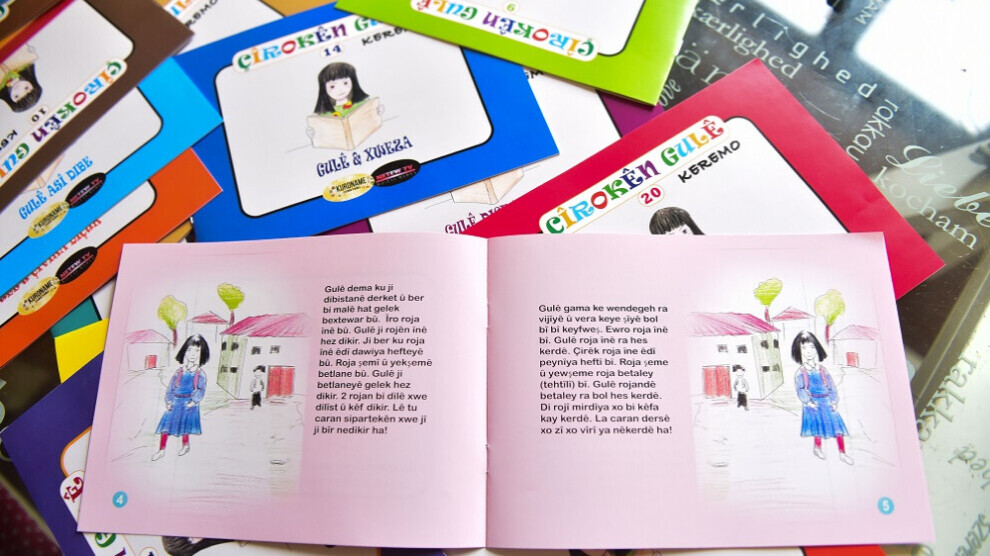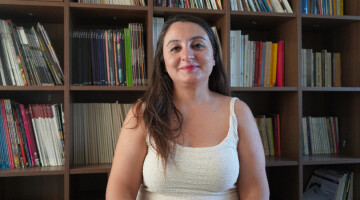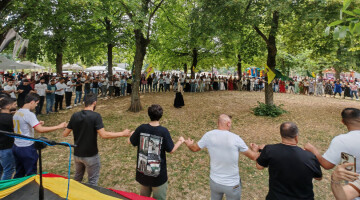Director Kerem Tekoğlu who shot many documentaries such as “Qulingê Brîndar” (Wounded Flamingo), “Dîno” and “Humanist”, wrote a Kurdish book series for kids named “Çîrokên Gulê” (Tales of Gulê). The series published by J&J publishing house is composed of 20 books written in Kurmancî and Kirmanckî dialects of Kurdish. Tekoğlu answered ANF’s questions on his books and the Kurdish language threatened with assimilation and expressed that this series is a Newroz gift for the kids.
How did this project emerge?
25 million Kurds live in Turkey and because of assimilation policies, Kurdish is about to vanish. Especially the Kirmanckî dialect is in a compelling survival and it may face an entire disappearance by the time of the next generation. While thinking over what could be done against this danger, I observed that it was extremely necessary to produce a printed project. So, I decided to write a book series for kids since I had written and directed children’s play before.
Why did you prefer writing a book series for kids?
A language can keep living and progressing mainly thanks to children. If we can teach our children their mother tongue, then, we can leastwise save and improve our language. However, Kurdish must absolutely be a language of education in order for the danger of total disappearance to be eliminated.
How do you interpret the definition of Kurdish as an “unknown language” by some circles in addition to restrictions ongoing for years and rejections on Kurdish to be a language of education despite insisting demands?
In 21st century, it is a big shame to treat a language currently spoken by 50 million people as “an unknown language”. This means rejecting the science, as well. I am one of the 50 million Kurds and Kurdish is my mother tongue. Assimilation policy against the Kurds continues without pausing today, as in the past. Just therefore, we aim to add a drop of water into the ocean of this language, in order to keep Kurdish, one of the richest and the oldest languages of the Middle East, alive.
You are 36 years old and conserved your mother tongue by speaking it in daily life. What do you think about the present generation? Are they luckier than you or vice versa?
According to me, they are not luckier than our generation. I can tell that the misfortune is more extensive especially for the Kurdish children living in metropolises because they always face negative factors in the streets, at school, on their smart phones, televisions at their homes and in every areas of daily life that cause the Kurdish language to disappear. At this point, a great responsibility falls upon the parents. They should convert their homes to a Kurdish language school in order for children not to forget their mother tongue.
What sort of contents did you prefer in these books?
Every book comprises an educational story. Gulê, the protagonist character, is placed as a role-model of respecting the parents in one of the books, of protecting the nature in another book and of reading book and improving herself in one other.
The nature, humanity and the animals are the outstanding themes in the books. Each book is composed of 16 pages and these pages follow each other consecutively in Kurmancî and Kirmanckî dialects. Hence, children can improve themselves in both dialects. The pictures in the books were drawn by Delal Arîn and Delil Tarım and the books were designed by Azad Zal. The Zazaki dialect was translated by Enver Yılmaz and edited by Firuzan Demir.
How can children get these books?
They can find these books in every shop selling Kurdish books and, on the website, of course.
What would you like to say lastly?
There is something everyone can do to make sure that this rich language rooted in thousands of years does not disappear. Especially the Kurds living in Turkey should mobilize to this end and struggle for the right to mother tongue education in Kurdish.















